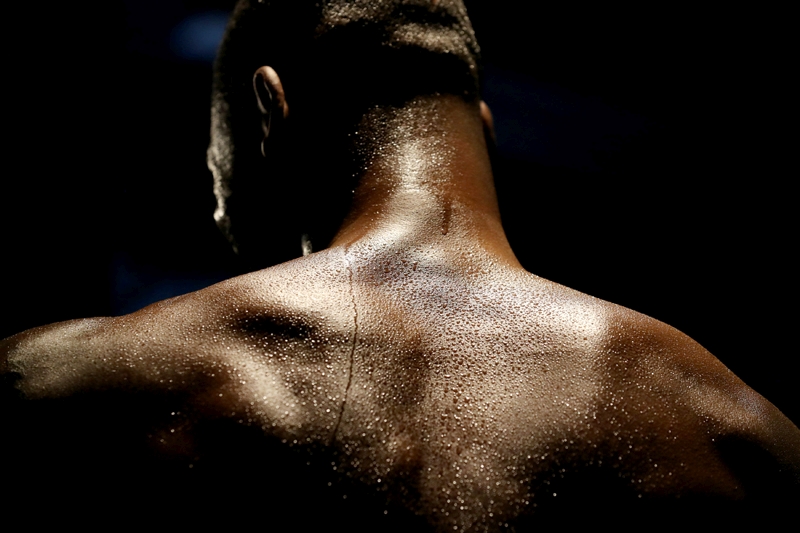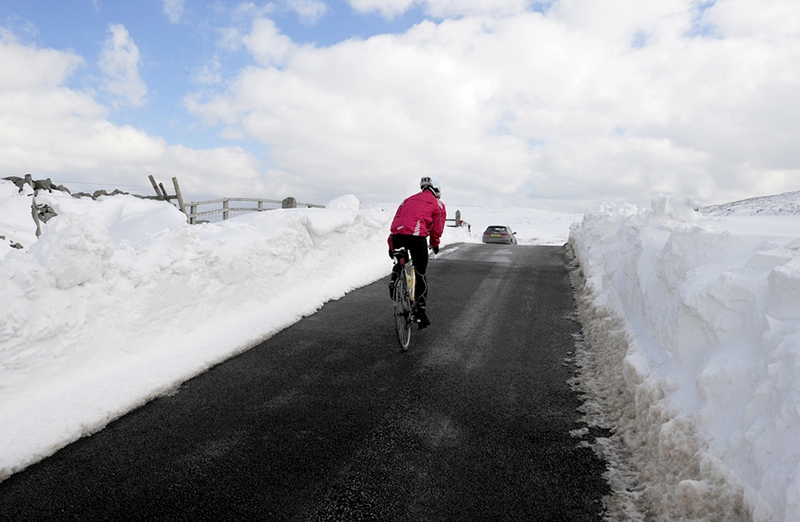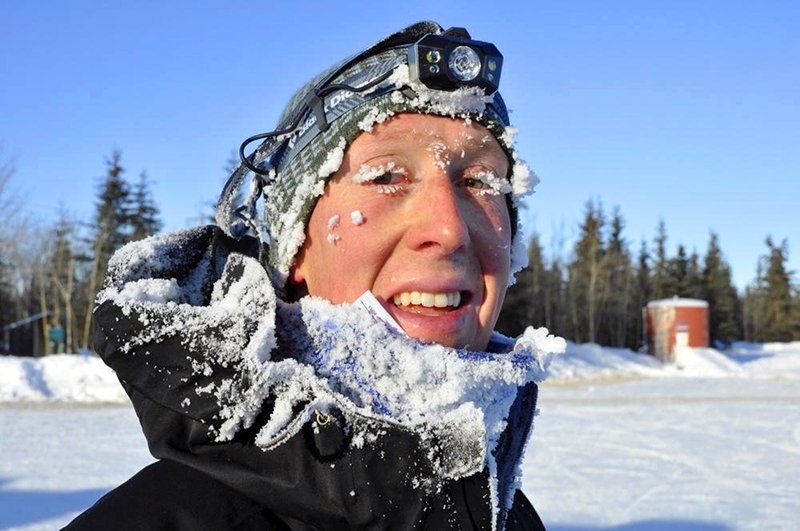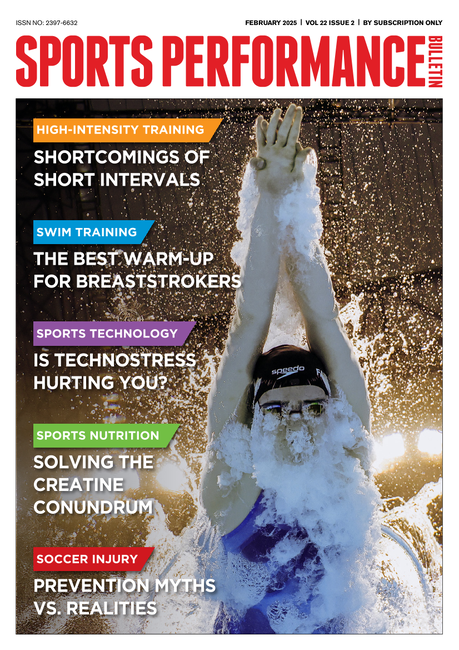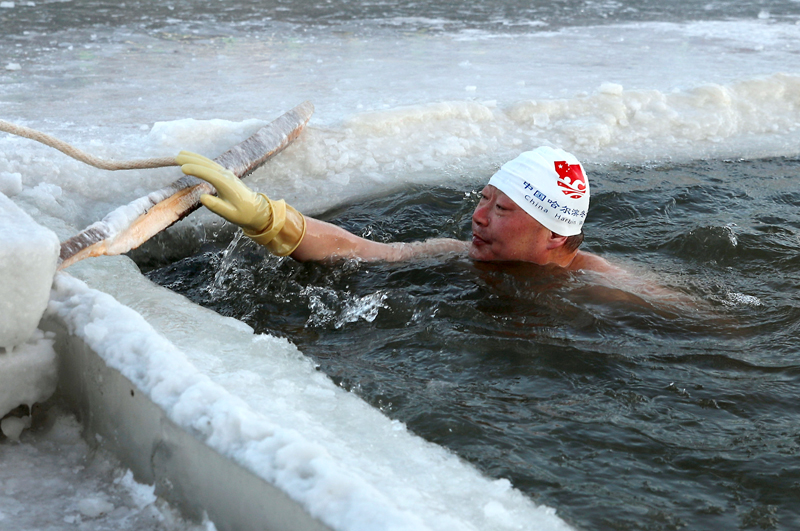You are viewing 1 of your 1 free articles. For unlimited access take a risk-free trial
Mint performance: beating heat (and cold) with menthol!

Andrew Hamilton looks at some recent and fascinating research on how menthol could help athletes beat the heat - and combat the cold!
The chemical compound '2-Isopropyl-5-methylcyclohexanol' is abbreviated by chemists to menthyl alcohol - but you probably know is just as 'menthol'. Although it is most commonly associated with a natural substance occurring in peppermint and mint oil - and hence as a peppermint 'flavor fortifier' - it turns out that menthol has some other interesting properties too. In particular, it has a counter-irritant effect on skin and mucous membranes, thereby producing a local analgesic or anesthetic effect, and it is widely used to relieve minor throat irritation.Menthol is cool
One of the reasons for the properties described above is that menthol possesses the ability to chemically trigger the cold-sensitive 'TRPM8 receptors' in the skin, which produces well-known cooling sensation when menthol is inhaled, eaten, or applied to the skin. This 'cooling' action of menthol has recently provoked interest in its use as a potential performance booster for athletes competing in the heat. The theory is that if menthol can reduce the perception of heat, athletes using menthol might be able to reduce their levels of thermal discomfort when exercising in hot condition (higher levels of thermal discomfort are known to impair exercise performance). However, a counter argument against menthol is that by encouraging athletes to exercise harder in hot conditions, menthol use could increase the risk of heat illness - because athletes will be less aware of the signs and symptoms of overheating. So which is correct?A fairly recent British study sought to shed light on this by answering two questions(1): 1) Does menthol use in the heat really relieve thermal discomfort? 2) Does menthol use in the heat lead to a rise in core temperature, putting athletes at risk of heat illness? In this study, eight male participants completed two trials in hot conditions (33.5 °C, 33% relative humidity) where their t-shirt was sprayed with a control spray (water) or a menthol spray 10kms into a 16km cycling time trial (ie when they were hot and uncomfortable). The key finding was that compared to water, a menthol spray didn't affect the time trial performance but it DID made participants feel cooler and more comfortable, resulting in lower perceived less exertion. Moreover, the core temperatures of the cyclists rose equally in both the water and menthol conditions - ie there was no evidence that menthol use put the cyclists at any additional risk of heat stress/illness.
Menthol vs. ice
The following year (2016), a team of Aussie and British scientists carried another study on menthol use in hot conditions(2). What they investigated was whether merely reducing the sensation of thermal discomfort by using a menthol mouth rinse was in any way comparable in terms of performance to reducing actual thermal load by consuming a pre-exercise ice slurry drink (a technique known to reduce core temperature.To test this, 11 moderately trained male runners each completed three trials consisting of 5km runs on a non-motorised treadmill in hot conditions (33°C) on three separate occasions. However, the trials varied as follows:
- In one trial, they consumed an ice slurry ingestion before the trial.
- In another trial, they used a menthol mouth rinse during the trial.
- In a third trial, they consumed nothing before or during the trial (control).
Head scratching
At this point, you’re probably wondering why the menthol mouth rinse was better for performance than the ice slurry - which in theory, should have helped performance in the heat? The most likely explanation is that the menthol rinse significantly decreased the amount of perceived thermal sensation (how hot and uncomfortable the runners felt), especially between 4 and 5kms. This reduced thermal sensation almost certainly helped ‘trick’ the brain into believing effort levels were lower, allowing the runners to run faster! The ice slurry meanwhile didn’t reduce thermal sensation, even though it did actually reduce core temperatures.Although this might seem rather bizarre, there’s good evidence for the rationale as a large body of recent research has established that your physical performance is profoundly influenced by not only the body’s physiology and biochemistry during exercise, but also how the brain perceives that exercise/effort. This explains why uplifting music can suddenly boost your energy levels halfway during a bout of exercise – even though nothing has changed physiologically! This effect is known as the ‘central governor theory’ – you can read more about it and how to use it to enhance performance in this Sports Performance Bulletin article.
Very recent evidence
Another very recent study into menthol use to combat heat was published just earlier this year(3). This study looked at trained cyclists’ exercise capacity and time to exhaustion in the heat with and without the use of a menthol spray. Like the study above(1), the researchers found that using a menthol spray after 20 minutes and again after 40 minutes significantly lowered thermal discomfort (although the perceived benefits were less later on during exercise). However, unlike the study above, they also found that menthol use enhanced performance by significantly extending time to exhaustion. They also found that menthol use resulted in slightly lower sweat production; given that sweating serves to reduce core temperature, the researchers cautioned against the repeated use of menthol during extended exercise bouts in the heat.Confirming the benefits of menthol in the heat, a meta-analysis (a study that summarizes the findings from previous studies on a topic) published just two weeks ago concluded that ‘exercise performance can be improved by application of non-thermally cooling menthol, which also reduces perceptual measures of thermal sensation’(4).
Beating cold with menthol
A final twist in the menthol story is even more bizarre because it seems that menthol could help protect athletes against the cold. How so you ask? Well, if you remember, one of the modes of action of menthol is to stimulate cold receptors in the skin. When cold receptors are stimulated, vasoconstriction (blood flow reduction) in the skin occurs. This reduces blood flow to the cold skin, and with it, heat loss (heat is transported from the body’s core to the surface via blood vessels).The vasoconstriction effect of menthol has led researchers to wonder if applying menthol to the skin of swimmers before immersion in cold water could help reduce heat loss in the water, and help keep core temperatures elevated – useful for swimmers undertaking long events in cold water. In one study, swimmers were immersed in a body of stirred water (to simulate motion through the water) at 24C/75F (ie somewhat cool)(5). The results showed that the application of a menthol cream prior to immersion prolonged the time to the onset of shivering – and reduced heat loss to the water (evidenced by a slower reduction in core temperature.
In a follow-up study, the same team of researchers examined the effects on heat loss of pre-immersion menthol cream on swimmers who were immersed in cool (24C/75F) and cold (14C/57F) water. What they discovered in this trial was that rubbing in menthol cream help reduce heat loss both at 24c and 14C. However, the benefits of menthol at 14C were rather less apparent than at 24C. Why the difference? The most likely explanation is that at 14C, the thermal sensation is already so cold that the cold receptors are near to maximally stimulated; using the menthol cream therefore didn’t provide much additional stimulation!
Practical implications
Menthol isn’t just a great flavor fortifier; the evidence for the benefits of menthol use in hot and cool conditions is very persuasive. By reducing the sensation of thermal discomfort, the same workload performed in hot conditions is likely to feel easier in hot conditions. If the duration of exercise is longer, it may also help improve performance by delaying the onset of fatigue. Both menthol skin sprays and drinks containing menthol are likely to be effective. However, some caution is required; by potentially blunting sweat volumes, prolonged menthol use may not be advisable in very hot conditions and when access to adequate fluid consumption is difficult. Swimmers and triathletes who struggle in cooler open-water swims may also benefit from menthol application; simply applying a layer of cream under your wetsuit before entering the water could help ward off the worst effects of the cold!References
- Scand J Med Sci Sports. 2015 Jun;25 Suppl 1:211-8. doi: 10.1111/sms.12395
- Scand J Med Sci Sports. 2016 Oct;26(10):1209-16
- Int J Sports Physiol Perform. 2019 May 1;14(5):644-649
- J Sci Med Sport. 2019 Jun;22(6):707-715.
- Scand J Med Sci Sports. 2017 Dec;27(12):1560-1568
- Scand J Med Sci Sports. 2018 Mar;28(3):1193-1200
Newsletter Sign Up
Testimonials
Dr. Alexandra Fandetti-Robin, Back & Body Chiropractic
Elspeth Cowell MSCh DpodM SRCh HCPC reg
William Hunter, Nuffield Health
Newsletter Sign Up
Coaches Testimonials
Dr. Alexandra Fandetti-Robin, Back & Body Chiropractic
Elspeth Cowell MSCh DpodM SRCh HCPC reg
William Hunter, Nuffield Health
Keep up with latest sports science research and apply it to maximize performance
Today you have the chance to join a group of athletes, and sports coaches/trainers who all have something special in common...
They use the latest research to improve performance for themselves and their clients - both athletes and sports teams - with help from global specialists in the fields of sports science, sports medicine and sports psychology.
They do this by reading Sports Performance Bulletin, an easy-to-digest but serious-minded journal dedicated to high performance sports. SPB offers a wealth of information and insight into the latest research, in an easily-accessible and understood format, along with a wealth of practical recommendations.
*includes 3 coaching manuals
Get Inspired
All the latest techniques and approaches
Sports Performance Bulletin helps dedicated endurance athletes improve their performance. Sense-checking the latest sports science research, and sourcing evidence and case studies to support findings, Sports Performance Bulletin turns proven insights into easily digestible practical advice. Supporting athletes, coaches and professionals who wish to ensure their guidance and programmes are kept right up to date and based on credible science.
